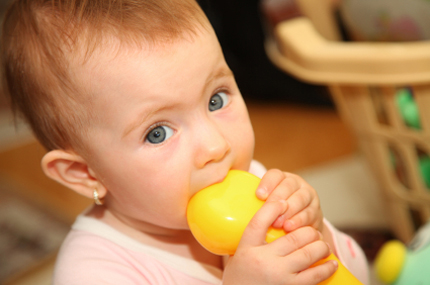Plastic makes men more feminine
Some chemicals in plastic toys, bags, and products have the ability to control the activity of male sex hormones, making boys more feminine.
According to the BBC, the phthalate chemical group - which works to increase elasticity in plastic and keep odors in some personal care products - has been banned for use in toys in Europe for many years. However, they are still widely used in the production of many other household items - including furniture, bags, wrapping paper - in many countries around the world.
In the article published in the International Journal of Andrology, scientists at the University of Rochester (USA) claim that some chemicals in the phthalate group have the same effect on estrogen-sex sexual hormones. They said that if exposed to these substances regularly, their son is at risk of abnormal testicular syndrome. In addition, phthalate groups also negatively affect brain development by blocking testosterone activity - male sex hormones.
To demonstrate this claim, Rochester University scientists analyzed urine samples from 145 pregnant women from when they were pregnant to birth to determine the levels of phthalates. These women gave birth to 74 boys and 71 girls. When the children are 4 and 7 years old, the team asks their parents about the objects and games they often play.

If plastic toys have chemicals that belong to the phthalate group, they will prevent the effect of male sex hormones that make boys feminine.Photo: greenandcleanmom.org.
The results showed that DEHP and DBP - two phthalate groups and appear in most women - can affect human behavior. Dr Shanna Swan, the lead researcher, said boys who have been exposed to many DEHP and DBP since being in the womb tend to shy away from toys for men - cars, trains, and guns. Instead, they are more likely to like female toys such as dolls, flowers, and fruits. These boys also rarely participate in activities such as kicking football, their movements are "more rhythmic".
Elizabeth Salter-Green, director of CHEM Trust, commented that the research results of the University of Rochester are very interesting.
'We all know that phthalate can cause many bad health problems. We are all exposed to phthalate groups on a daily basis. These chemicals can undermine men's fertility and also make them more feminine. With that effect, we can call the phthalate group an agent of gender bias , "said Salter-Green.
Some argue that the boys the University of Rochester researched are too young to be able to tell their future, but Salter-Green asserted that their teenage feminine behaviors could increase. up in adulthood.
- What to know about 'feminine hygiene solutions'
- Absolute feminine animals in nature
- What happens to a plastic bottle after being thrown into the trash?
- Men are 'feminine' easy to achieve at work
- Iron makes feminine
- Hanoi University of Technology successfully researched self-destructing plastic bags made from cassava flour
- Startled with the amount of plastic you are eating into your mouth every year
- How will the new enzyme destroy plastic?
- 'We have been through the age of stone, copper, iron and now plastic, which is really scary.'
- Scientists find the world's first reusable plastic
- Detection of bacteria capable of biodegradable plastic
- How long does it take for plastic waste to decompose?
 Green tea cleans teeth better than mouthwash?
Green tea cleans teeth better than mouthwash? Death kiss: This is why you should not let anyone kiss your baby's lips
Death kiss: This is why you should not let anyone kiss your baby's lips What is salmonellosis?
What is salmonellosis? Caution should be exercised when using aloe vera through eating and drinking
Caution should be exercised when using aloe vera through eating and drinking